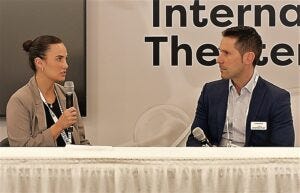Content Spotlight
Podcast: MilliporeSigma says education vital to creating unbreakable chain for sustainability
MilliporeSigma discusses the importance of people, education, and the benefits of embracing discomfort to bolster sustainability efforts.

The lack of standardized methods for new modalities means open discussions with advanced therapy clients are critical, says Charles River amid spiraling testing demand.
Despite a slow start for the year, biologics testing is on the up for Charles River Laboratories. The life sciences services firm this month announced plans to set up shop at Wheeler Bio’s plant in Oklahoma, and at the recent BIO event in Boston spoke about a barrage of demand from advanced therapy makers.
Referencing viral vectors and plasmid DNA, Luis Berrade, senior director Global Biologics Testing Sales at Charles River, said the past five years has seen a clear increase in demand versus the more traditional biologics offering of recombinant proteins, antibodies, and vaccines.

CRL’s Luis Berrade was interviewed at the BioProcess Insider Theater at BIO in Boston this month
“While we still see a lot of new antibodies going into the pipeline, I think in terms of growth probably viral vectors is the area where we are seeing a huge increase in demand,” he told BioProcess Insider.
However, these new modalities require a lot of testing and there are fewer validated platforms and methods established in this space. “That requires maybe a little bit more development work and qualification and validation work before you can use those methods to release the product into the clinic.”
While there will always be a need to do some development work for antibodies, for example, there are numerous established platform methods that the firm can leverage, he said. But for cell and gene therapies “we need a custom approach. We need to evaluate the product itself and see maybe what the mode of action would be for that specific – for example – gene therapy product viral vector.”
Moreover, the lack of experience in the space on the regulatory front also makes testing of advanced therapies more complex. This is, he said, “probably triggering more questions when pharma [firms] or biotechs go into the pre-IND [Investigational New Drug] or IND discussions. In order to answer all those questions, they need to do some additional work with the methods to characterize and to release the product.”
This lack of knowledge and non-standardized methods for assessing some of the quality attributes for these new modalities means “it’s very important to have an open discussion with clients to understand what their goal is, what they want to achieve, what technology they’re working on,” he said. “And then we can slowly work on an approach where we can develop the method that really fits their needs.”
Berrade added timelines continue to be one of the critical issues or challenges that clients are facing with their molecules – “the quicker we can develop and qualify the method so that they can use it for a release of the material, the better” – but this must be balanced with assurances of quality.
“Of course, it’s always nice to have a validated method for Phase I, but it’s actually worth having discussions with clients around what their real needs are, and then maybe, base our approach, or target our approach, on their needs.”
You May Also Like